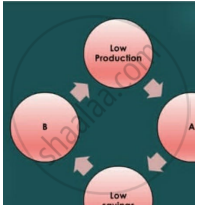Advertisements
Advertisements
Question
Were there any positive contributions made by the British in India? Discuss.
Solution
Yes, there were various positive contributions that were made by the British in India. The contributions were not intentional but purely the effects of colonial exploitation of the British.
The following are the positive contributions made by the British:
- Introduction of Railways: The introduction of railways by the British was a breakthrough in the development process of the Indian economy. It opened up the cultural and geographical barriers and facilitated commercialisation of Indian agriculture.
- Introduction of Commercialisation of Agriculture: The introduction of commercial agriculture is an important breakthrough in the history of Indian agriculture. Prior to the advent of the British, Indian agriculture was of subsistence nature. But with the commercialisation of agriculture, agricultural production was carried out as per the market requirements. It was due to this factor that today India can aim at attaining self-sufficiency in food grains production.
- Introduced Free Trade to India: British forced India to follow free trade pattern during the colonial rule. This is the key concept of globalisation today. The free trade provided the domestic industry with a platform to compete with the Britain industries. The introduction of free trade led to an increase in the volume of India’s export rapidly.
- Development of Infrastructure: The infrastructure developed in India by the British proved a useful tool to check the spread of famines. The telegram and postal services served the Indian public.
- Promoted Western Culture: English as a language promoted a westernized form of education. The English language acted as a window to the outside world. This has integrated India with the rest of the world.
- Role Model: The way and the technique of the British administration act as role model for Indian politicians and planners. It helped Indian politicians to govern the country in an efficient and effective manner.
APPEARS IN
RELATED QUESTIONS
Name some notable economists who estimated India’s per capita income during the colonial period.
What objectives did the British intend to achieve through their policies of infrastructure development in India?
Critically appraise some of the shortfalls of the industrial policy pursued by the British colonial administration.
What do you understand by the drain of Indian wealth during the colonial period?
Underscore some of the India’s most crucial economic challenges at the time of independence.
During colonial period India’s demographic profile showed ______.
Who made significant estimates about calculating national income in India during the British period?
In which of the following sectors is manufacturing activity included?
Which industry suffered a major setback during the British rule?
‘Since independence, India has witnessed a considerable fall in the Infant Mortality Rate in India’ Identify which of the following may not be one of the reasons for the fall in the Infant Mortality Rate?
Choose the correct alternatives to be filled in given blanks A and B.

What were the impacts of the economic policies pursued by the colonial government in india?
Which of the following economists estimated India's per capita income during the colonial period.
Dadabhai Naroji advocated the theory of 'Drain of Wealth' in the ______ century.
Which of the following points indicates the drain of Indian wealth during the colonial period?
